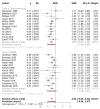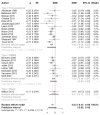Effectiveness of Mantra-Based Meditation on Mental Health: A Systematic Review and Meta-Analysis
- PMID: 35329068
- PMCID: PMC8949812
- DOI: 10.3390/ijerph19063380
Effectiveness of Mantra-Based Meditation on Mental Health: A Systematic Review and Meta-Analysis
Abstract
Background: Meditation is defined as a form of cognitive training that aims to improve attentional and emotional self-regulation. This systematic review aims to evaluate the available scientific evidence on the effectiveness and safety of mantra-based meditation techniques (MBM), in comparison to passive or active controls, or other active treatment, for the management of mental health symptoms.
Methods: MEDLINE, EMBASE, Cochrane Library, and PsycINFO databases were consulted up to April 2021. Randomised controlled trials regarding meditation techniques mainly based on the repetition of mantras, such as transcendental meditation or others, were included.
Results: MBM, compared to control conditions, was found to produce significant small-to-moderate effect sizes in the reduction of anxiety (g = -0.46, IC95%: -0.60, -0.32; I2 = 33%), depression (g = -0.33, 95% CI: -0.48, -0.19; I2 = 12%), stress (g = -0.45, 95% CI: -0.65, -0.24; I2 = 46%), post-traumatic stress (g = -0.59, 95% CI: -0.79, -0.38; I2 = 0%), and mental health-related quality of life (g = 0.32, 95% CI: 0.15, 0.49; I2 = 0%).
Conclusions: MBM appears to produce small-to-moderate significant reductions in mental health; however, this evidence is weakened by the risk of study bias and the paucity of studies with psychiatric samples and long-term follow-up.
Keywords: mantra-based meditation; mental health; meta-analysis; systematic review.
Conflict of interest statement
The authors declare no conflict of interest.
Figures











References
-
- Rose S., Zell E., Strickhouser J.E. The Effect of Meditation on Health: A Metasynthesis of Randomized Controlled Trials. Mindfulness. 2020;11:507–516. doi: 10.1007/s12671-019-01277-6. - DOI
-
- Walsh R. Meditación. Nat. Medicat. 1996;43:16–22.
Publication types
MeSH terms
LinkOut - more resources
Full Text Sources
Miscellaneous

